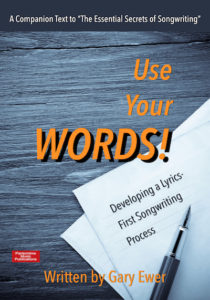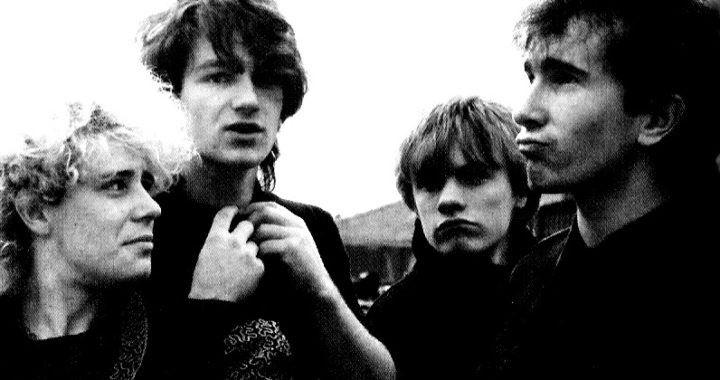If you’re looking to improve your songwriting abilities, you can do no better than to look to some of the best songs written, and then figure out how the writers of those songs were able to write them. Then hopefully, you can apply what you learn to your own songs.
It’s not usually that easy, of course. It’s hard because all songs are unique. You certainly can’t do exactly what other songwriters have done in their own songs, or else you’re simply repeating someone else’s success, and then you’re wandering into the world of plagiarism.
 Are you ready to have LYRICS take a much more important role in your songwriting process. You need to read “Use Your Words! Developing a Lyrics-First Songwriting Process.” Right now, it’s FREE with your purchase of “The Essential Secrets of Songwriting 10-eBook Bundle.”
Are you ready to have LYRICS take a much more important role in your songwriting process. You need to read “Use Your Words! Developing a Lyrics-First Songwriting Process.” Right now, it’s FREE with your purchase of “The Essential Secrets of Songwriting 10-eBook Bundle.”
It’s a better approach if you listen to a great song, and then answer some basic questions about that song. If you can answer those questions, you have the chance to apply what you’ve learned to what you do, and keep getting better.
The first step, though, is to start keeping a songwriting journal, if you aren’t doing that already.
What a Songwriting Journal Could or Should Look Like
There are lots of ways to keep a journal, and every songwriter’s journal will look different. Some use a journal to keep interesting bits of lyric, poetry, chord progressions, or perhaps titles of interesting songs to listen to later. Some use it as a kind of musical diary, making notes on musical interactions they’ve had with other songwriters, performers and industry personnel. Since it serves to organize your thoughts on songwriting, it can look any way you want it to look.
But to be particularly useful, I think a good journal should include specific things that you learn about other good songs — and things that you learn from other good songs.
Five Questions About Any Song That You Should Be Able to Answer
The kind of things you can learn from a song can be summarized by listening to that song enough that you know it by heart, both to sing it, and perhaps to play it. Then answer the following five questions:
- What is the one characteristic about this song that you like the most? It could be anything, including aspects that aren’t necessarily songwriting qualities, such as vocal style, performance style, the chorus melody, a particular bit of lyric (a lyrical hook), etc.
- What, if anything, surprises you about this song? Does it stray outside of the genre you expect from the performer/performing group? Is there something about the instrumentation, melodies or chords that go beyond what you were expecting?
- Are there any obvious similarities or differences when you compare the different melodies (verse, chorus, other) that happen in this song?
- If you were to shorten or lengthen this song by 30 seconds, what change would you make? What could you remove that would maintain the integrity of the song? How would you make this song 30 seconds longer?
- What are the lines of lyric that you think are the most powerful? If you were asked to contribute an extra verse lyric, what might it be?
No doubt there are probably a lot more questions you could ask about a song, and if you’re coming up with your own questionnaire-style analysis form, feel free to include whichever questions apply to the kinds of songs you’re likely to listen to.
If I were to answer those five questions after listening to, let’s say, U2’s “Sunday Bloody Sunday”, I’d probably answer this way:
- I particularly like the sparse, military-style drum beat. It’s unique enough to get my attention.
- I’m surprised by how repetitive the song is without being tiresome.
- The verse melodies tend to move in an upward direction while the chorus hook moves downward. I like that contrast.
- To shorten it, I’d try diving into verse 1 without the intro. Could also try the song without the guitar-based instrumental at 2’38”. To lengthen the song, it could probably work with a longer guitar solo at 2’38”.
- Lots of powerful lyrics in this song, but the ones that resonate with me are “There’s many lost, but tell me who has won” and “When fact is fiction and TV reality”.
By doing this kind of analysis, you’re allowing every song you to the opportunity to act as a musical model. In so doing, you’ll find that those songs will start to guide the way you write, and you’ll find that any good song you listen to will serve to improve your own songwriting technique.
 Written by Gary Ewer. Follow Gary on Twitter.
Written by Gary Ewer. Follow Gary on Twitter.
 The perfect combination: “The Essential Secrets of Songwriting 10-eBook Bundle” and a Study Guide! Dig into the songwriting manuals that thousands of songwriters are using to polish their technique, complete with a study guide to show you how to progress through the materials.
The perfect combination: “The Essential Secrets of Songwriting 10-eBook Bundle” and a Study Guide! Dig into the songwriting manuals that thousands of songwriters are using to polish their technique, complete with a study guide to show you how to progress through the materials.










